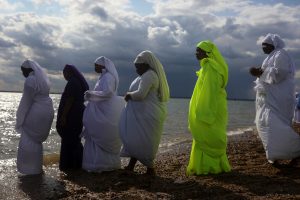
By Simon Dawson and William Schomberg
LONDON (Reuters) – On a cold, grey Sunday morning, in a street lined with shuttered builders’ yards and storage units, songs of prayer in the West African language of Yoruba ring out from a former warehouse that is now a church.
The congregation, almost entirely dressed in white robes, steadily grows to around 70 people as musicians playing drums, a keyboard and a guitar pick up the pace of the hymns. Some women prostrate themselves on the floor in prayer.
In the sparse formerly industrial building, its interior brightened by touches of gold paint, a speaker reminds the group of a list of banned activities — no smoking, no drinking of alcohol, no practicing of black magic.
In a street outside, a pastor flicks holy water over the car of a woman who wants a blessing to ward off the risk of accidents.
The busy scene at the Celestial Church of Christ is repeated at a half a dozen other African Christian temples on the same drab street and in the adjacent roads – one corner of the thriving African church community in south London.
Around 250 black majority churches are believed to operate in the borough of Southwark, where 16 percent of the population identifies as having African ethnicity.
Southwark represents the biggest concentration of African Christians in the world outside the continent with an estimated 20,000 congregants attending churches each Sunday, according to researchers at the University of Roehampton.
Reflecting the different waves of migration to Britain in the 20th Century, Caribbean churches began to appear in the late 1940s and 1950s as workers and their families arrived from Jamaica and other former British colonies.
African churches opened their doors in London from the 1960s, followed by a second wave in the 1980s.
Migrants, many of them from Nigeria and Ghana, sought to build communities and maintain cultural connections with their home countries by founding their own churches, often founded in private homes, schools and office spaces.
As the communities grew, the churches moved into bigger spaces in bingo halls, cinemas and warehouses, gathering congregations of up to 500 people where services are streamed online by volunteers with video cameras.
There is a striking contrast with the empty pews at many traditional Church of England churches where congregations have dwindled for years.

Female members of the Apostles Of Muchinjikwa Christian church prepare to enter into the sea during a mass Baptism (Jorodhani) on the beachfront on Southend-on-Sea, Britain, August 25, 2018. REUTERS/Simon Dawson
“We pray for this country,” said Abosede Ajibade, a 54-year-old Nigerian who moved to Britain in 2002 and works for an office maintenance company.
“People here brought Christianity to Africa but it doesn’t feel like they serve Jesus Christ anymore.”
Anyone traveling around south London on a Sunday morning will see worshippers, often dressed in dazzlingly colored African clothes, making their way to churches, each with their different styles of worship.
Hymns are sung only in African languages in some temples, or only in English at others. Some pastors take worshippers for full immersion baptisms in the cold of the English Channel. Others believe that when congregants suddenly start speaking in unknown languages it marks the presence of the Holy Spirit.
But the researchers from the University of Roehampton found things that many churches have in common, including a drive for professional advancement, a commitment to spend three hours or more at Sunday service and typically very loud worship.
“That is how we express our joy and gratitude to God,” Andrew Adeleke, a senior pastor at the House of Praise, one of the biggest African churches in Southwark, in a former theater.

Senior members of the Apostles Of Muchinjikwa Christian church baptise members during a mass Baptism (Jorodhani) on the beachfront on Southend-on-Sea, Britain, August 25, 2018. REUTERS/Simon Dawson
“The church is not supposed to be a graveyard,” Adeleke said. “It is supposed to be a temple of celebration and worship and the beauty is to be able to express our love to God, even when things are not perfect in our lives.”
For some, the noise from amplified services is a problem, leading to complaints to local authorities from residents.
But many churches face bigger challenges than unhappy neighbors: Some provide food for people struggling to make ends meet, or work with young people at risk of recruitment by gangs.
Andrew Rogers, who led the University of Roehampton researchers, said pastors had to juggle retaining the churches’ African identity while appealing to children of first generation immigrants, many of whom have never lived outside Britain.
They typically have a more liberal world view which can be hard to reconcile with conservative Pentecostal teachings.
Rogers recalled speaking to one pastor who lamented he was unable to talk about religious miracles to his children.
“If the church doesn’t adapt, then they are going to leave and look elsewhere,” Rogers said.
Click on https://reut.rs/2GgX5Qv for a related photo essay.
(Writing by William Schomberg, Editing by William Maclean)
